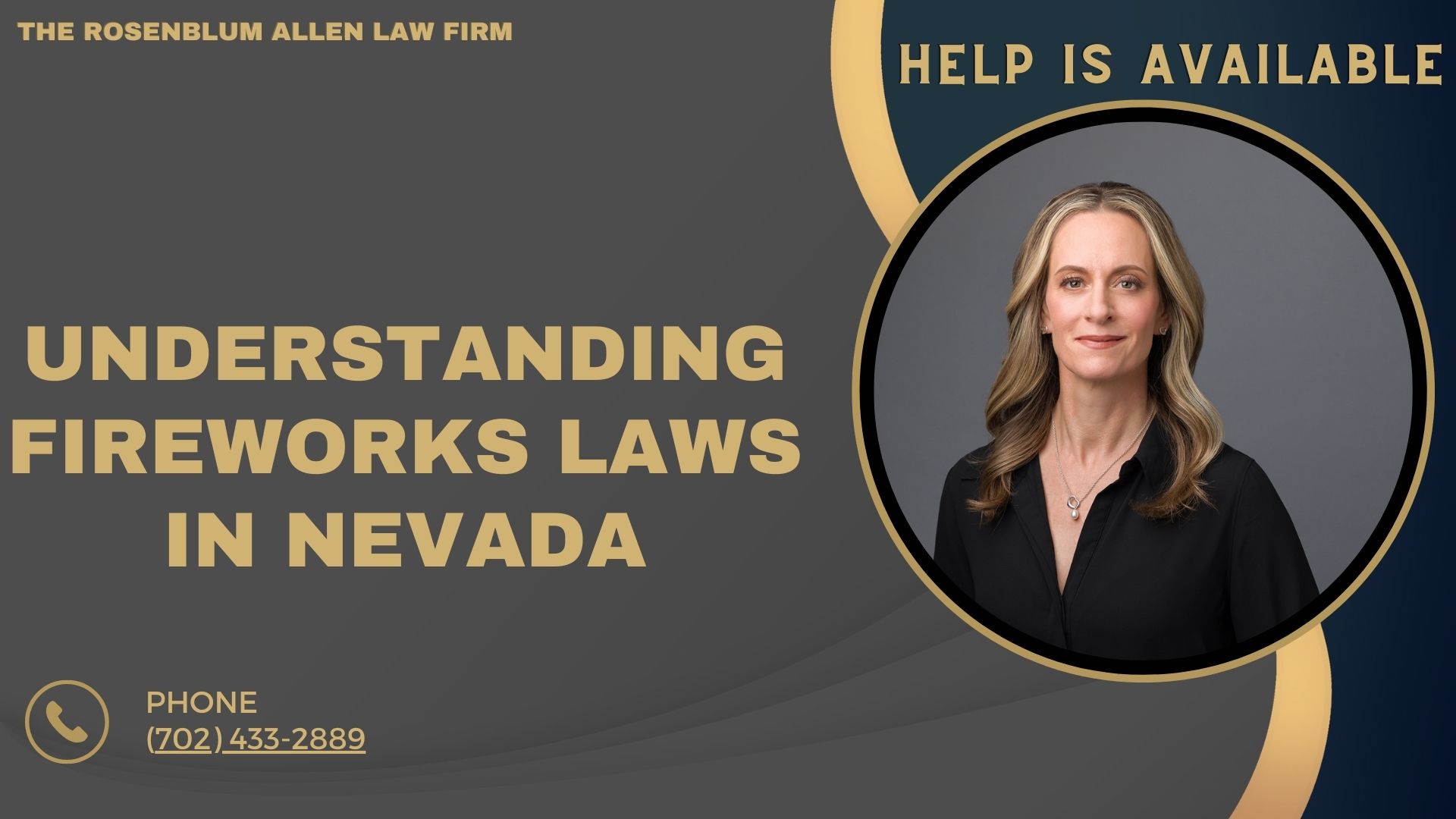Nevada is known for its vibrant celebrations, especially around major holidays. Fireworks are a popular way to mark Independence Day and New Year’s Eve events. However, it’s crucial to understand Nevada’s fireworks laws to ensure safety and compliance. The laws surrounding fireworks vary, and violations can result in significant penalties. This article provides an in-depth guide to the state’s fireworks regulations, helping residents, visitors, and businesses stay informed about what’s legal and safe.
 General Overview of Fireworks Regulations in Nevada
General Overview of Fireworks Regulations in Nevada
Fireworks laws in Nevada govern the sale and use of fireworks and the types of fireworks that can be legally purchased and displayed. Whether you are a resident planning to celebrate with fireworks or a visitor looking to participate in the festivities, knowing the state’s rules is essential to avoid potential fines and legal issues.
Definition of Fireworks Under Nevada Law
Fireworks are generally defined as devices containing an explosive substance intended to produce visible or audible effects through combustion, explosion, or detonation. Nevada law categorizes fireworks into two broad types:
- Consumer fireworks: These are the fireworks that individuals can legally purchase and use.
- Professional-grade fireworks: These are typically used by licensed professionals for public displays and require special permits.
Overview of Statewide Regulations Governing the Sale and Use of Fireworks
In Nevada, the sale and use of consumer fireworks are regulated by state laws and local ordinances. State law permits the sale of certain types of fireworks between June 28 and July 4 and December 28 and January 1, while other types may only be used during these periods unless otherwise specified by local governments.
Different Types of Fireworks Legally Allowed and Restricted in Nevada
Nevada law distinguishes between fireworks allowed for consumer use and those banned for safety reasons. Understanding these differences is essential to ensure compliance with the law.
Legal Fireworks in Nevada
Nevada law allows for various consumer fireworks, provided safety standards, and local regulations use them. Here’s a breakdown of what’s legal in the state.
List of Fireworks That Are Legal to Purchase and Use in the State
Legal fireworks in Nevada include:
- Sparklers
- Fountains
- Ground spinners
- Smoke devices
- Snakes
- Rockets (without sticks)
These fireworks can be legally purchased from licensed retailers, especially around the Fourth of July and New Year’s holidays.
Distinction Between Consumer Fireworks and Professional-Grade Fireworks
- Consumer fireworks are intended for individual use. They are typically small and require minimal training. These are the most common fireworks seen at backyard celebrations and private events.
- Professional-grade fireworks require specialized handling and are usually reserved for large public displays organized by licensed pyrotechnicians. These are more powerful and are generally prohibited for public purchase and use.
Safety Guidelines for Legally Using Fireworks
Even with legal fireworks, safety is paramount. Here are a few tips to safely use fireworks:
- Always supervise children when they are using sparklers or other fireworks.
- Keep a bucket of water or a fire extinguisher nearby.
- Only use fireworks outdoors in clear, open spaces.
- Follow all local laws regarding fireworks use, especially in dry conditions with higher fire risks.
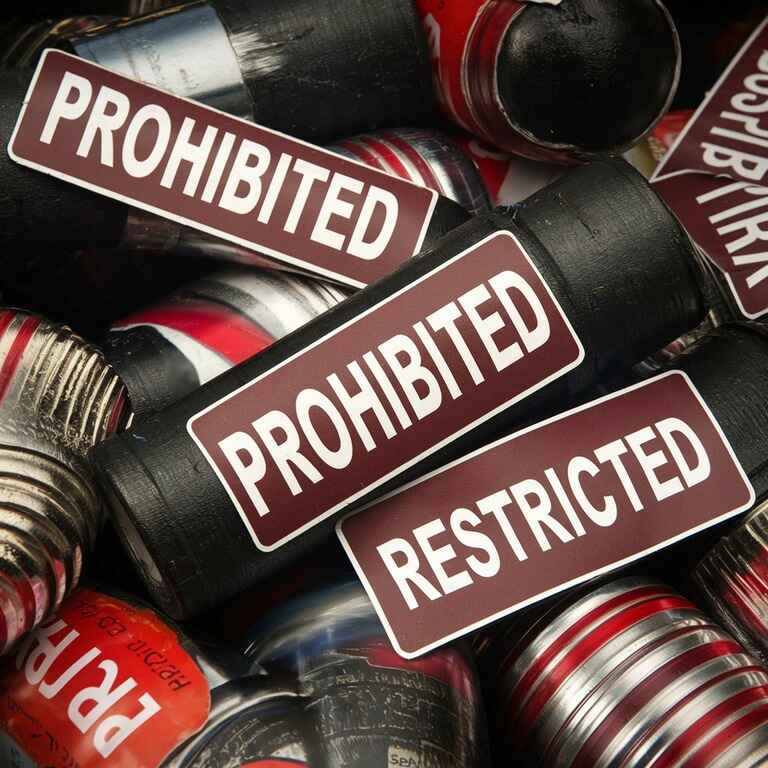
Illegal Fireworks in Nevada
While many fireworks are legal in Nevada, several types are prohibited due to safety concerns. The state takes fire safety seriously, particularly during the hot, dry summer.
Overview of Fireworks That Are Banned in Nevada
Illegal fireworks in Nevada include:
- Firecrackers
- Bottle rockets
- Skyrockets
- Aerial spinners
- M-80s and similar devices
These fireworks are banned because they pose significant safety risks, such as causing fires, injuries, or property damage.
Explanation of Why Certain Fireworks Are Prohibited for Consumer Use
The fireworks listed above are prohibited because they can:
- Reach dangerous altitudes
- Cause uncontrolled explosions
- Cause damage to people and property
- Pose a high risk of igniting fires.
Penalties for Possessing or Using Illegal Fireworks
Using or possessing illegal fireworks in Nevada can result in severe penalties. Individuals caught with banned fireworks may face the following:
- Fines: Penalties for possessing illegal fireworks can range from several hundred to several thousand dollars.
- Confiscation of Fireworks: Law enforcement may confiscate illegal fireworks.
- Criminal Charges: In some cases, possessing illegal fireworks can result in misdemeanor or felony charges, mainly if the fireworks cause damage or injury.
This section highlights the importance of understanding which fireworks are allowed and taking precautions to avoid using illegal or dangerous devices.
Fireworks Regulations by County and City in Nevada
While Nevada has statewide regulations for fireworks, local counties, and cities have the authority to enforce their own rules. This means that what’s legal in one area may be restricted in another. It’s essential to understand both state and local laws to stay compliant.
Overview of Local Ordinances and How They May Differ From State Law
Each county or city in Nevada can implement its restrictions on fireworks, making it tricky for those unfamiliar with the area. For example, some towns have stricter bans during certain times of the year, while others may allow fireworks year-round.
Specific Regulations for Las Vegas and Other Major Cities in Nevada
Las Vegas and other major cities in Nevada often have more restrictive fireworks laws due to the high population density and the increased risk of fire damage. In Las Vegas, fireworks are generally banned year-round, but there are exceptions during certain holidays, like New Year’s Eve and the Fourth of July. However, even during these times, firework use may be restricted to specific areas or events.
Here’s a quick summary of regulations in major areas:
| Area | Fireworks Law |
|---|---|
| Las Vegas | Fireworks generally banned, with exceptions for holidays and public events. |
| Henderson | Limited to certain dates and types of fireworks. |
| Reno | Consumer fireworks legal during certain holidays with a ban in dry conditions. |
| Sparks | Similar restrictions as Reno, but stricter penalties for illegal use. |
Restrictions Based on Fire Danger and Seasonal Bans
In many areas, local authorities may impose fire bans during dry periods, especially in summer. Fireworks are often prohibited when the fire danger is high. For example, if a drought has left the area especially vulnerable to wildfires, you may find that fireworks are not allowed, even during holidays.
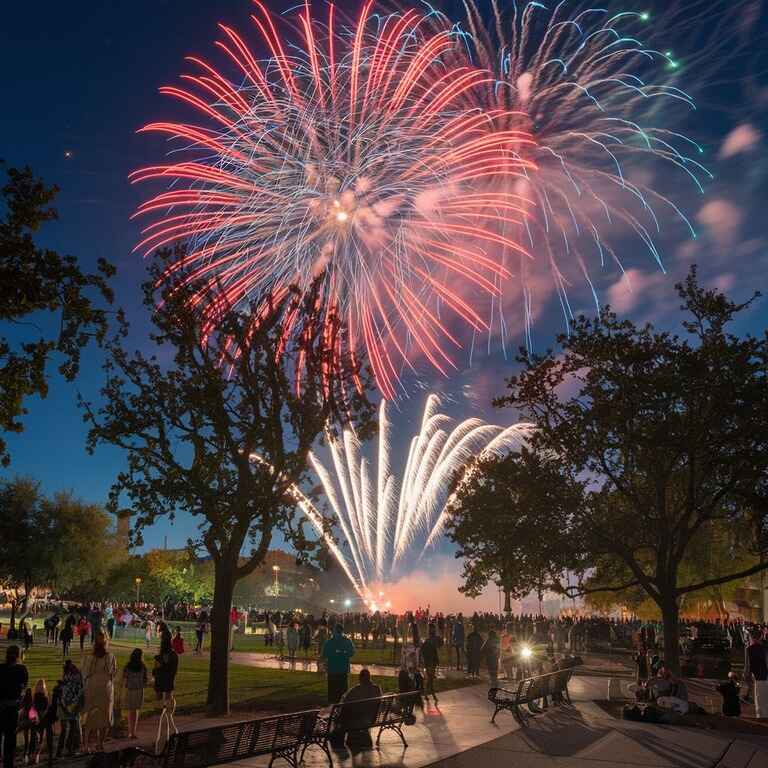
Where You Can Legally Use Fireworks in Nevada
Fireworks are a lot of fun but come with a lot of responsibility. Knowing where to use them safely and legally is essential to avoid unwanted consequences.
Public vs. Private Property: Understanding Where Fireworks Can Be Safely Used
The rules vary depending on whether you plan to light fireworks on public or private property.
- Private Property: You can use fireworks on your property if you follow local regulations and ensure the area is safe (e.g., no dry grass, nearby structures, or flammable materials).
- Public Property: Using fireworks on public property (like parks or streets) is usually restricted. You’ll often need special permission or permits to use fireworks in public spaces. Some cities, like Las Vegas, may have designated public spaces where fireworks can be legally displayed.
Local Restrictions on Where Fireworks Displays Can Take Place
Many local governments designate specific areas for public fireworks displays. For example, Las Vegas holds large, controlled fireworks shows on the Strip, but these displays are carefully monitored by professionals and subject to strict rules. Local authorities may also designate parks, open spaces, or other large, clear areas for fireworks use, particularly during major holidays.
Specific Venues That Allow Fireworks (e.g., Parks, Public Events)
If you want to avoid the hassle of finding a legal space to set off fireworks, consider attending a professional public fireworks display. In many cities across Nevada, there are public events where fireworks are not only allowed but are the celebration’s highlight.
These venues often include:
- Community festivals
- Concerts and performances
- Holiday celebrations (Fourth of July, New Year’s Eve)
- Sports events, like Las Vegas Golden Knights games
For example, the city of Henderson often hosts professional firework displays at parks during the Fourth of July, where residents can enjoy the show without worrying about setting them off themselves.
Fireworks Purchase Laws in Nevada
Before using fireworks, you need to know how to purchase them legally. Understanding the rules around buying fireworks in Nevada will help you avoid surprises.
Legal Age to Purchase Fireworks in Nevada
In Nevada, you must be 18 years old to purchase consumer fireworks. Retailers are required to ask for proof of age, so make sure you have a valid ID if you plan to buy fireworks. This rule helps prevent minors from handling potentially dangerous fireworks.
Where You Can Legally Buy Fireworks (e.g., State-Approved Retailers)
Fireworks can only be sold by licensed retailers. Temporary stands may pop up During designated firework seasons—typically around the Fourth of July and New Year’s Eve—especially in popular areas like Las Vegas. The state and local authorities generally regulate these stands.
You can buy fireworks at:
- Licensed retail stores: These are the central locations for purchasing fireworks during the legal periods.
- Temporary stands: Set up during peak seasons, often near highways and busy areas.
Make sure the fireworks you buy come from licensed sellers. Buying from unapproved sources can be risky legally and in terms of the quality and safety of the fireworks.
Temporary Sales Locations During Certain Times of Year
Around major holidays, temporary fireworks stands often appear in high-traffic areas. These locations may pop up in parking lots, highways, and shopping centers. Be sure to only buy from stands marked with permits and licenses. These stands are only authorized to operate during specific periods, such as from June 28 to July 4 and December 28 to January 1.
If you’re unsure whether a stand is legitimate, ask for a copy of the vendor’s license or check the state’s official website for a list of approved fireworks vendors.
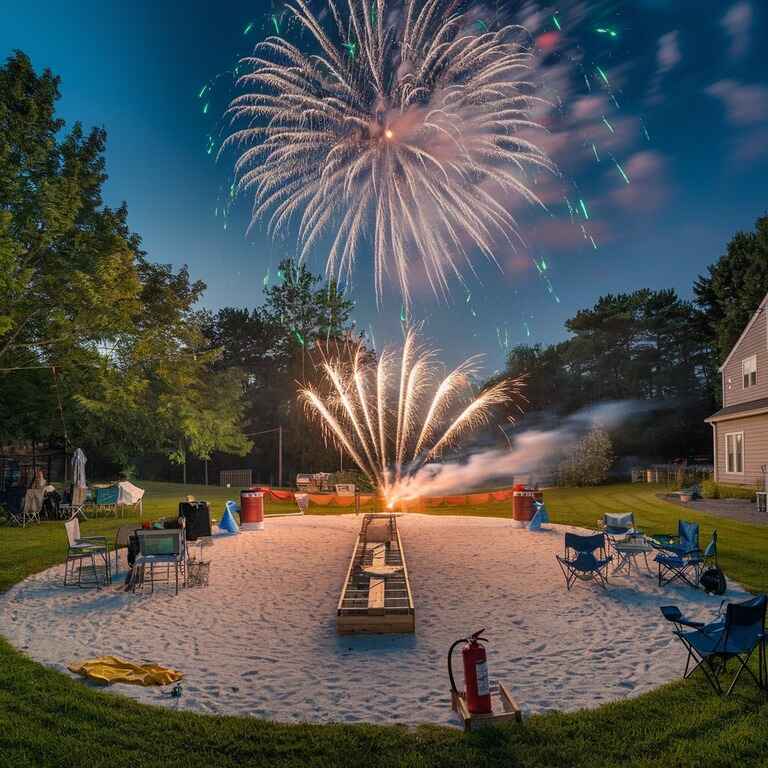
Fireworks Safety Guidelines
Fireworks can be thrilling, but they also come with risks. That’s why safety should always be your top priority when handling fireworks. Whether lighting them off at a backyard celebration or attending a public show, being mindful of safety can help prevent injuries and accidents.
Personal Safety Tips for Handling and Igniting Fireworks
Before you light a firework, make sure you’re taking steps to protect yourself and others. Here are some key safety tips:
- Keep a safe distance: Always light fireworks from a safe distance away from spectators, especially children.
- Use a flat surface: Place fireworks on a flat, stable surface, such as the ground or a solid, fire-resistant platform.
- Light one firework at a time: Never light multiple fireworks at once. Always light one, then move back to a safe distance.
- Light fireworks with a long-handled lighter minimize the risk of your hand being too close to the firework when it ignites.
- Never re-light a “dud”: If a firework doesn’t go off, wait at least 20 minutes before approaching it. Duds can explode unexpectedly.
- Wear protective gear: Wear safety glasses and sturdy shoes when handling fireworks.
Fireworks Safety Equipment
Having the proper safety equipment on hand can be a lifesaver in case something goes wrong. Here’s a list of the most essential safety gear you should always have:
- Water source: A bucket of water, a garden hose, or a fire extinguisher should always be within arm’s reach.
- Fire extinguisher: Keep a fire extinguisher on hand in case of a small fire.
- First aid kit: Keep a well-stocked first aid kit nearby for treating minor burns or injuries.
- Flashlight: If you’re setting off fireworks at night, a flashlight can help you see what you’re doing and keep everything under control.
What to Do in Case of Accidents or Injuries Involving Fireworks
Accidents can happen, no matter how careful you are. If someone gets injured while handling fireworks, take immediate action:
- For minor burns, Rinse the burn with cold water for at least 10 minutes and cover it with a sterile bandage.
- For serious injuries: If the injury is severe (like deep burns or eye injuries), seek medical help immediately. Call 911 or go to the nearest emergency room.
- For fires: If a fire starts, use a fire extinguisher or pour water over the flames. Don’t tackle large fires alone—evacuate the area and call the fire department.
Penalties for Violating Nevada Fireworks Laws
Understanding the penalties for breaking fireworks laws can help you avoid serious consequences. Whether you’re caught using illegal fireworks or violating local fire regulations, the consequences can range from fines to criminal charges.
Overview of Fines and Criminal Penalties for Illegal Use of Fireworks
Nevada takes fireworks safety seriously, and violations can lead to significant penalties. Here’s what you need to know:
- Fines: Depending on the violation, fines for illegal fireworks use can range from a few hundred dollars to thousands. Setting off illegal fireworks or using them in restricted areas can result in fines of up to $1,000.
- Confiscation of Fireworks: If law enforcement finds you possessing illegal fireworks, they may confiscate them. This could also lead to further penalties.
- Misdemeanor Charges: Violations of fireworks laws can often result in misdemeanor charges, especially for minor offenses like using fireworks in a prohibited area.
- Felony Charges: Serious violations, such as causing significant property damage or starting a wildfire with fireworks, could result in felony charges. Felony charges carry much harsher penalties, including more substantial fines and possible imprisonment.
Potential Civil Liability for Damages Caused by Improper Firework Use
If fireworks cause harm or damage to someone else’s property, you could be held liable in civil court. You may need to pay for any damages or injuries caused by the fireworks you set off. Civil liability can be expensive, especially if significant damage or personal injury is involved.
- Property Damage: If your fireworks cause a fire that damages property, you could be forced to pay for repairs or replacement.
- Injuries: If someone is injured due to your fireworks, you could be responsible for their medical bills, pain and suffering, and other costs.
Explanation of Misdemeanor vs. Felony Charges Depending on the Severity of the Violation
The severity of the violation will determine whether you face misdemeanor or felony charges.
- Misdemeanors: These are typically for minor infractions, such as using fireworks in a restricted area or possessing a small amount of illegal fireworks. Misdemeanors may result in fines, community service, or short-term jail time.
- Felonies: If your actions cause significant harm, like starting a wildfire or seriously injuring someone, you could face felony charges. Felonies carry much harsher penalties, such as lengthy prison sentences and higher fines.
It’s always better to be cautious and follow the law to avoid these penalties.
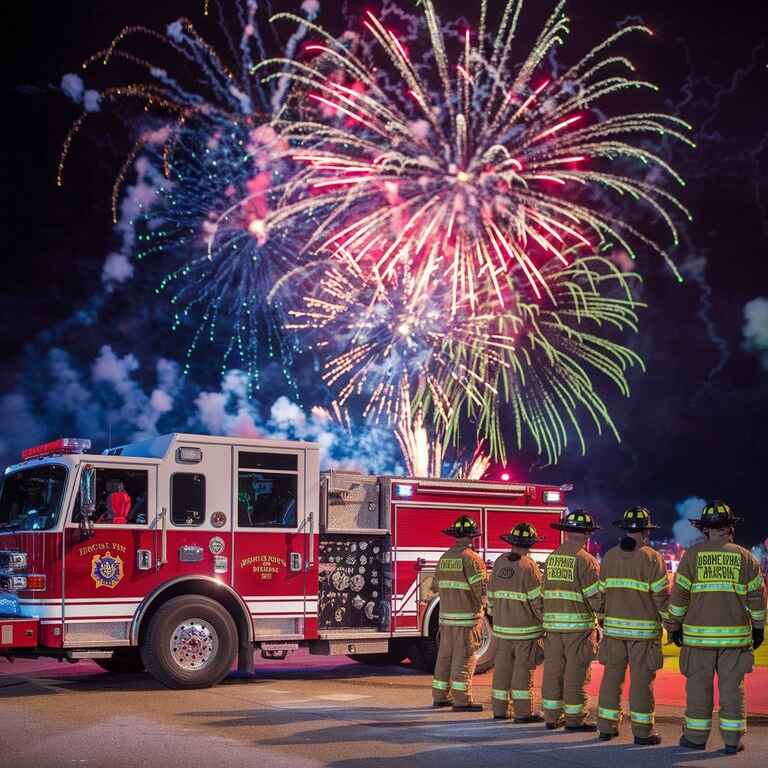
Fireworks and Fire Safety
Given Nevada’s dry climate, fireworks can be a significant fire hazard. Whether you’re in the desert or the city, it’s essential to take steps to prevent wildfires and other fire-related accidents.
Connection Between Fireworks and Fire Hazards in Nevada’s Dry Climate
Nevada’s warm, dry conditions make it especially vulnerable to wildfires. The risk of fires is significantly higher when fireworks are most commonly used in the summer. Even a tiny spark from a firework can ignite dry grass, brush, or trees, leading to destructive wildfires.
Many local governments impose seasonal bans on fireworks when the fire danger is high. These bans reduce the risk of accidental fires and keep residents and wildlife safe.
How to Prevent Wildfires and Accidents Caused by Fireworks
To reduce the risk of starting a wildfire or causing an accident, follow these simple steps:
- Check weather conditions: Avoid using fireworks during high winds or dry conditions.
- Clear the area: Make sure the area where you’re lighting fireworks is clear of dry grass, leaves, or other flammable materials.
- Properly extinguish fireworks: After using fireworks, immediately place them in a bucket of water to ensure they’re entirely out before disposing.
Best Practices for Safe Disposal of Used Fireworks to Prevent Fires
Don’t just throw fireworks away carelessly once you’ve finished using fireworks. Here’s how to dispose of them safely:
- Soak them: Place used fireworks in a bucket of water and leave them there for several hours to ensure they’re fully extinguished.
- Proper disposal: Place the used fireworks in a trash bin after soaking. Never throw them in a recycling bin.
- Avoid hot spots: Be mindful of your surroundings when disposing of fireworks. Even after soaking, fireworks may retain heat, so always check before discarding them.
Following these fire safety tips can help prevent wildfires and protect your community from fire-related damage.
Alternatives to Traditional Fireworks in Nevada
While fireworks are a popular way to celebrate in Nevada, they’re not always the best option for everyone. Several alternatives can make your celebration spectacular, whether you’re concerned about safety, the environment, or noise.
Safe and Legal Alternatives for Celebrating with Fireworks
If you want to enjoy the fun of fireworks without actually lighting them yourself, here are some great alternatives:
- Laser Shows: Many places in Nevada, especially Las Vegas, offer dazzling laser light shows as an alternative to traditional fireworks. These shows are colorful, captivating, and much safer than using fireworks.
- LED Glow Stick Displays: LED glow sticks or wands are a fun way to add light to your celebrations. They’re safe, reusable, and perfect for kids and adults alike.
- Firework Simulators: Firework simulators are an option for those who love the visual effects of fireworks but want to avoid the risks. These use advanced technology to create the illusion of fireworks without the dangers.
- Skydiving Fireworks Shows: Some professional shows combine skydiving with fireworks displays. Parachutists carrying small, controlled fireworks light up the night sky from above.
Each of these alternatives provides a spectacular visual experience without the potential hazards of traditional fireworks.
Fireworks Displays Put on by Professionals in Nevada
If you’re not up for handling fireworks, you can always enjoy a professionally organized show. Nevada has some of the best public fireworks displays in the country, especially in cities like Las Vegas. Professional shows are extensive, well-planned, and much safer than individual displays.
Here are some of the best professional fireworks events to enjoy in Nevada:
- Las Vegas Strip: The Fourth of July and New Year’s Eve celebrations on the Strip feature massive firework shows coordinated across multiple resorts. These shows are a must-see if you’re in the area.
- Henderson’s Independence Day Fireworks: Henderson hosts a family-friendly fireworks display every year, providing a safe and controlled environment for residents and visitors to enjoy the festivities.
- Reno’s “Star Spangled Sparks” Event: Reno’s annual firework show is another popular event, held at a public park with ample space for spectators to watch in safety.
- Lake Tahoe’s Fireworks: If you’re visiting Lake Tahoe, their Fourth of July fireworks show is a fantastic way to celebrate while enjoying the beautiful surroundings.
Community Events and Public Firework Shows in Major Cities Like Las Vegas
Many communities in Nevada organize public fireworks shows for those who want to participate in a large celebration without using fireworks. These events unite people to enjoy a safe, organized, spectacular display. You’ll find these shows in parks, stadiums, and along waterfronts, particularly around major holidays.
Most public firework events in Nevada also feature entertainment, food trucks, and live music, making them a perfect choice for families and friends to gather and enjoy a night out. Some notable events include:
- Las Vegas New Year’s Eve Fireworks: One of the most significant firework events in the country, held on the Las Vegas Strip, attracts thousands of visitors every year.
- Elko’s Fireworks Celebration: Held annually for the Fourth of July, this small-town celebration is known for its tight-knit community feel and spectacular firework shows.
No matter where you are in Nevada, there’s a good chance you can find a public firework display that’s both safe and enjoyable. Check your local event calendars for the latest information on dates, times, and locations.

Breaking It All Down
Nevada’s fireworks laws are designed to keep residents and visitors safe while allowing for fun and celebration. Whether you’re planning to light off legal fireworks or enjoy a professional display, understanding the rules can help ensure you follow the law. Always prioritize safety, check local ordinances, and explore some exciting alternatives to traditional fireworks for a safer, more sustainable way to celebrate. With proper precautions and planning, you can enjoy all the beauty and excitement that fireworks bring—without the risks.

Frequently Asked Questions
Are fireworks legal in Nevada?
Fireworks are legal in Nevada, but only certain types of fireworks are allowed, and state and local laws regulate their use. Each county or city may have different rules regarding when and where fireworks can be used, so it’s important to check local ordinances.
When can I use fireworks in Nevada?
The state generally allows consumer fireworks during specific periods, such as around the Fourth of July (June 28 to July 4) and New Year’s Eve (December 28 to January 1). However, local restrictions may apply, especially during dry or fire danger periods.
Can I light fireworks in Las Vegas?
In Las Vegas, fireworks are generally banned year-round. Some exceptions exist, such as during public events like New Year’s Eve or the Fourth of July. Still, you must check local rules or attend a professional fireworks show to enjoy fireworks safely.
What are the penalties for using illegal fireworks in Nevada?
Penalties for using illegal fireworks in Nevada can include fines, confiscation of fireworks, and misdemeanor or even felony charges, depending on the severity of the violation. Fines can range from a few hundred dollars to thousands, and in severe cases, you could face criminal charges if you cause property damage or harm.
What are some safe alternatives to traditional fireworks in Nevada?
If you’re looking for safer alternatives, consider options like laser shows, LED glow sticks, or professional firework displays put on by cities or organizations. These alternatives provide a similar visual experience without the risks of handling fireworks.
Where can I buy fireworks in Nevada?
Fireworks can be legally purchased from licensed retailers during certain times of the year, typically leading up to the Fourth of July and New Year’s Eve. Temporary stands may pop up in high-traffic areas like parking lots or along highways. Always ensure you buy from authorized vendors to avoid issues with illegal fireworks.
Are fireworks banned during high-fire risk periods in Nevada?
Yes, many counties and cities impose bans on fireworks during periods of high fire risk, particularly during dry weather conditions. These bans help prevent wildfires and other fire-related accidents, and local authorities enforce them.
Can I use fireworks on public property in Nevada?
Using fireworks on public property is generally prohibited, but there may be specific designated areas or events where public fireworks displays are allowed. Always check with your local government for any special permits or areas where fireworks are legally allowed on public land.
What should I do if an accident occurs with fireworks?
Take immediate action if someone is injured or a fire occurs due to fireworks. For burns, rinse with cold water and cover with a sterile bandage. For serious injuries, call 911. If a fire breaks out, use a fire extinguisher or pour water on the flames, but if the fire is large, evacuate and call emergency services. Always have safety gear like a fire extinguisher and a first aid kit nearby.
What are the requirements for buying fireworks in Nevada?
You must be at least 18 years old to buy fireworks in Nevada. Ensure you purchase from licensed retailers, and check that the fireworks you buy are legal for use in your area. Temporary stands may operate during certain times of year but must also have the necessary permits.
How can I dispose of used fireworks safely?
After using fireworks, please place them in a bucket of water to ensure they are fully extinguished. Wait several hours before disposing of them in a trash can. Never throw used fireworks in a recycling bin, as they may pose a fire risk.

Additional Resources for You from The Rosenblum Allen Law Firm.
At The Rosenblum Allen Law Firm, we provide comprehensive legal services beyond surrogacy. Below are some additional resources that may be helpful, with embedded links for your convenience:
Criminal Defense Attorney: If you are facing criminal charges, our experienced defense team is here to protect your rights and fight for the best possible outcome.
Las Vegas DUI Lawyer: We help individuals accused of DUI offenses navigate the legal process, minimize penalties, and protect their driving privileges.
Domestic Violence Lawyer Las Vegas: If you are dealing with allegations of domestic violence, we offer compassionate representation to help you through these challenging situations.
Drug Possession Lawyer: Whether you’re facing misdemeanor or felony drug charges, we provide aggressive legal defense to safeguard your future.
Sex Crimes Attorney: Our firm offers discreet, skilled representation for those accused of sensitive sex crime cases, ensuring that your rights are protected.
CPS Defense Attorney: If you are facing allegations of child abuse or neglect, we are here to protect your parental rights and guide you through the CPS process.
Misdemeanor Lawyer: For minor offenses, our team helps clients resolve their cases efficiently and minimize long-term consequences.
Las Vegas Warrant Defense Attorney: If you have an active warrant, we can help you address it before it escalates to an arrest.
Las Vegas Probation Violation Attorney: If you’ve been accused of violating probation, we’ll work to defend you and reduce potential penalties.
Theft Crime Defense Lawyer: Whether you’re facing shoplifting or more serious theft charges, our firm is prepared to defend your case.
Kidnapping Lawyers: If you’re dealing with kidnapping charges, we’ll provide strategic legal support tailored to your situation.
Juvenile Defense Lawyers: Our firm is dedicated to protecting the rights of juveniles and helping them navigate the justice system.
Firearms Lawyer Las Vegas: We assist clients accused of firearm-related offenses, ensuring their rights are preserved and their cases are handled effectively.
Let us know how we can help. At The Rosenblum Allen Law Firm, your case is our priority. Feel free to reach out to us for assistance or consultation!

Offsite Resources for You
Here are some useful offsite resources related to Nevada fireworks laws that you may find helpful:
Nevada Division of Forestry – https://www.forestry.nv.gov/: This site provides information on wildfire prevention, fire safety, and local fire restrictions in Nevada.
Nevada Fireworks Laws – https://www.nevadacountyfair.com/: This resource offers comprehensive information on Nevada’s fireworks laws and regulations, helping you stay informed about what’s legal and safe.
Nevada State Fire Marshal – https://firemarshal.nv.gov/: A great resource for understanding safety protocols, rules about fireworks, and fire hazard prevention in Nevada.
Clark County Fire Department – https://www.clarkcountynv.gov/fire/: Clark County’s website offers updates on fire regulations and fireworks safety specific to the Las Vegas area.
Las Vegas Metro Police – https://www.lvmpd.com/: This site provides information on law enforcement rules regarding fireworks in Las Vegas, including laws and safety practices.
U.S. Fire Administration – https://www.usfa.fema.gov/: This federal resource focuses on fireworks safety and fire prevention across the country, including the specific risks in Nevada.
Fireworks Safety Council – https://www.fireworkssafety.org/: An informative site dedicated to promoting fireworks safety, offering guidelines on legal fireworks and safe usage practices.

A Special Message from Our Lead Attorney, Molly Rosenblum Allen, Esq

Thank you for taking the time to explore these resources on Nevada fireworks laws. I hope you found the information helpful and that it has clarified the rules and safety measures. If you have further questions or need assistance, my team and I are here to help. Please call us at (702) 433-2889, and we’ll get the ball rolling on finding the best solution for you.
Looking forward to hearing from you!
Best regards,
Molly
The Rosenblum Allen Law Firm

